|
Yes, I’ve been M.IA. It takes a lot to create something new…absurdly long gestation, relatively quick labor and birth, and now the craziness of a newborn (you can read the details about the birth of my new business at my other blog…when I’ve finished that post!) This seemed the perfect time to talk about metamorphosis and transformation—in other words, the island of Skyros. Each island has its own unique personality. None is like any other. Add to this, each unique soul’s experience there, and you’ve got limitless possibilities. You may disagree with me about my discomfort onMykonos or my mystical experiences at Delphi (like the American guy who laughingly shouted to his group, while in my most sacred place, “We came all this way to see a pile of rocks?!”) or being transfixed by the ancient statue of Artemis (I know, some say it is dedicated to one of her priestesses…regardless, her energy is there)in the National Archaeological Museum, but I think many of you would relate to my experience of Skyros. Many years ago, I met intuitive spiritual mystic extraordinaire Caroline Myss at a conference, and, in the middle of her birthday celebration dinner, she “read” me at the table. She went straight to, “What is this, your connection to Greece?” Before reading me, she asked my permission, and my mind immediately wandered to the possibility she might enlighten the table about my experiences with Greek men. She quickly reassured me, “No, I’m not going to talk about that.” (Now, the rest of you at our table know what that exchange was about.) She talked about my Greece-connection, weaving a rich tapestry, like the three beautiful-ugly women-witches in The Castle of Llyr (Have you read my beloved Lloyd Alexander books?). She ended the reading with, “I see you living on the island of Skyros.” I quickly corrected her, “No, you mean Skopelos.” She answered, “No, Rebecca. Skyros.” That was when I first heard about Skyros…I mean, really heard about Skyros. I was aware that it was at the edge of the Sporades…sharing this group with my favorite island Skopelos. I had yet to make it to Skyros. Honestly, I didn’t quite know what to make of it—this Sporades/Cycladic half-breed. I loved the dense green of the Sporades with its short, fat pine trees; the bareness, however, of the Cyclades sort of scared me. And Skyros had both. Caroline’s reading fueled my curiosity, and, a couple of years later, a group of dolphins accompanied me there (another story). One of my dear friends, who I had met while taking Greek classes at The Athens Centre, was working at the Skyros Centre. Skyros was her favorite island. She met her future husband there, married there, and returned every year until cancer stole her from us. I’ll never forget her extraordinary experiences on this mystical-mythical island. The great Minotaur paid her frequent visits, usually in the dark still night (I didn’t sleep too well after learning this.). One clear day, we climbed up the trail that led to a lone tree and looked back at the town; her future husband described what lay before us: “See how the town looks like a sleeping serpent/dragon? Do you see, there? Its eye is the site of the ancient temple of Athena. And look in the serpent’s mouth, what do you see? Its muzzle is the monastery.” One sacred night, we trekked up a different hill to participate in a celebration that was a bizarre but strangely comforting mix of Modern Greek Orthodoxy and ancient ritual. We drank from the blessed stream the most glorious water, rivaled only by its Delphic cousin’s spring. We experienced the radiant icon of Christ in a tiny chapel. And we ate goat meat--the only occasion on which my friend broke her vegetarian diet. I’ll never forget their beautiful wedding on the hillside, preceded by our winding procession through white-washed buildings and marble-stoned streets. And I’ll never forget Skyros’ strange paradox of profound deep calm and instantaneous, brazen transformation. It’s not by chance that nothing has appeared on this blog for two months.
What to write… It’s difficult to write anything humorous. Not right now. It’s not that anything has changed on the outside. Now is probably the best time to head on over, if you can. The dollar is high. Crowds are down. I doubt the financial crisis will affect Grecian hospitality just yet. No, it will probably hit when the summer tourism is over. I’m used to Grecian Seasonal Affective Disorder. It comes on big-time after the first fall day. When that sharp cool wind and clear crisp air replaces its hot hypnotic summer cousin, the Greeks can no longer deny the change of seasons. They talk less, laugh less, smile less, sleep more. Grecian SAD trumps its American cousin. It’s a wonder pharmaceutical companies haven’t taken advantage. It’s brutal. Many of my Greek friends don’t understand why I choose to come to Greece in the fall rather than in the summer. It’s true that many Greeks appear somewhat depressed, but they are also more relaxed. There is a calm resolution that comes with the harsh financial truth of insufficient summer tourism. I’m hoping that this calm will prevail, even after tens of thousands of tourists cancelled Athenian hotel reservations after the street riots in May. After all, the riots haven’t changed the intensity of the Grecian sun; surely elevated Vitamin D and testosterone levels must persist into the fall. The Greeks are highly resilient people, but, even so, I don’t envy their situation (or ours, for that matter). It’s going to be tough, folks, both here and there…so, if you’re considering a trip, go now! Remember my Βlessings and Generosity post? My dear Greek friends have come through. At a time when not one can afford to extend costly hospitality, several have offered their homes to me, as their guest. I know the extent of their hardship, and it makes me sad and proud, at the same time. The Greeks are generous, and during difficult times, their true nature shines through. I miss Greece. I want to get on the next Athens-bound flight, but it’s not the right time for me. The thought of not making it there soon has caused an early resurgence of my own American SAD. I hope you will travel there for me! Kalo Taksidi! Καλό Tαξίδι! Here it is, finally, the last of the five senses (replete with added benefits): 1. Crunch of small fish bones between teeth - A good source of calcium, too. Just make sure you swallow only the small ones...nearest emergency medical service is, um, Athens. 2. Large pebbles underneath feet and smaller ones in between toes - Improves circulation, and you can leave your pumice stone at home. 3. Relentless scorching sun - Yes, a definite melanoma hazard, but, hey, your clothes dry really fast! 4. Undulating enveloping womb-like sea—soft, warm, buoyant, caressing - Bad birth experience? You have a second chance. 5. Wind whipping across bodies, motorbike engine humming beneath, bugs smashing faces - If you're shooting for an economical trip, open your mouth (good protein, too). 6. Precarious balance on uneven pavement - Everyday walks down local streets double as sobriety tests (and keeps police pay reasonable, which is extremely important, given the current Greek economy). 7. Sticky white sea-salt on sun-dried skin - Get use to it. 8. Rough white-washed walls - You'll be pleasantly surprised on your return home, when your hands no longer get bruised or turn white when you accidently brush the wall. 9. Cold marbled floors against bare feet - One Greek solution to electricity-free and environmentally-friendly air conditoning. 10. Hard unyielding mattress and pillows—with bumps in the strangest places - Packing tip: remember tempurpedic travel pillow. Do they have travel mattresses-in-a-bag yet? What comes to mind when you think of Greece and touch? It’s that time of year. The risk for contracting Greek Fever is at an all-time high. Not sure you’re infected? I’d like to use my medical skills to help you out. Look for these twelve signs:
1. You can’t control your sudden urge to yell “Opa!” as your hands reach for the ceramic plates. 2. You realize any food goes well with ouzo. 3. Suddenly, iced Nescafe tastes better than your mocha frappuccino with double whip. 4. You don’t understand anyone in your dreams, because they’re all speaking Greek. 5. You ask your partner to dye his/her hair medium-dark brown, purchase olive-colored contact lens (the 24-hour kind so he/she can wear them to bed), and change their term of endearment for you from sweetie or honey to moro-mou or xriso-mou. 6. The California sun just isn’t bright enough for you anymore. 7. You’ve replaced breakfast with a cigarette (or with running outside to smell the smoke off of your co-worker’s), you now eat your main meal at 2pm, and you stay up all night long, every night. 8. You’re repetitively humming this song or watching this video (Thank you, Anthony Skordi, for both!) 9. You’re looking for the bathroom bin into which you throw your used toilet paper. 10. You’re asking your kids to “close the light” and “take a decision.” 11. If forced to choose between sunglasses and socks, in winter, you don’t hesitate: “sunglasses!” 12. It’s March, April, May, June, July, or August. Well, I hope it is of some comfort to you--you're in good company! Happy Easter * Happy Passover * Καλό Πάσχα * Peace * Shalom * Shlama’lokhun * Happy Spring * Χριστός ἀνέστη! Read this post on Rebecca's Blog here. Greek-American Actress Rita Wison talks about Greek Easter on The Washington Post here. Learn how to dye Easter eggs using onion skins here. All this talk lately of Greece’s deep debt and irresponsibility has gathered the world’s attention, but for me it’s old news. I experienced, up close and personal, the debate years ago when the hesitant decision was made to accept Greece into the EU and the subsequent almost doubling of prices with the adoption of the Euro. T R O U B L E was spelled in BIG CAPITAL letters way back then. My only surprise is that it has taken this long for the rest of the EU and world to recognize.
But in between discussions with foreigners living in Greece (There is nothing to discuss with the Greeks—we just give each other knowing shrugs, like “What else is new?” “What did the world expect?” “Life’s always been hard.” “Have we known anything different?”) another older discussion of freedom and social responsibility competes. I’m referring to the one that takes place in my head only, because there is no discussion with the Greeks. These are areas of striking dissimilarity between us, the imprisoned Americans and, them, the free Greeks. I remember the first Greek who looked at me, with that incredulous expression, the one I would see repeated many times, along with his words: “You Americans call yourselves free! FREE?! You are not free. WE are free. We do as we please. You are restricted on every level!” The first time I heard this, I thought, surely, I had misunderstood. But this same statement was repeated by countless others, each time accompanied by that same look of disbelief. We Americans were not free but controlled, in every aspect of our lives. Even our vacations were controlled, every hour planned down to the last minute. Slowly, I started to view freedom through their lens. I noticed the transparency of information about 9/11 present in every newspaper in every kiosk on every street corner…compared with the black box hush-hush response that greeted me and, quite frankly, freaked me out when I returned home just one month later. I noticed (how could I not?) the ease with which the Greeks carried out protests and strikes. Even the doctors went on strike, something I couldn't dream of in the U.S. Despite half the country on strike, life continued. A similar event on a much smaller level would incapacitate us. I started to recognize, adopt, and long for the ease with which the Greeks accepted life and death (a belief system that would simplify, greatly, my practice of medicine). Once I was living in Greece, it wasn’t long before I realized the flip side of Greek freedom—what I labeled as a lack of social responsibility. And I’m not talking about issues of injustice, but rather their different definition of responsibility, which included personal self and immediate loved ones only. This was hard for me to understand at first. Take, for example, a favorite Greek pastime, smoking. How dare anyone impose an outside standard! Second and third-hand smoke cancer-causing? Heck, I still remember my first Greek boyfriend proudly telling me that his cardiologist-friend had told him (while they were, no doubt, sharing a smoking break) that my friend had nothing to worry about, that he was in great physical health. Smoking would never harm him. This is why the decision-- let alone the reinforcement-- to ban indoor smoking was shocking to me. Of equal surprise was the shift to place garbage into bins rather than flinging assorted papers, wrappers (and, of course, cigarettes) onto the ground. I recall watching in horror when my boyfriend’s mother threw a paper cookie wrapper onto the church grounds outside her granddaughter’s baptism ceremony. Thank God I didn’t say anything. My boyfriend would have probably responded with that same incredulous look (and, let’s face it, he had already nicknamed me a word that meant “crazy-in-a-good-way,” although his sister didn’t seem to agree with his translation). One cannot expect to change overnight…or even over a lifetime…the way an entire nation thinks. The Greeks have developed excellent coping mechanisms after being under Turkish rule for almost 400 years. This includes their particular type of freedom, which I’ve come to believe is, indeed, much freer than ours. Oh, the visions of Greece! One of my favorite Grecian senses—and , I’m sure, yours too! So, without further ado, let’s get started: 1. Everything bathed in golden light: It’s the end of another glorious day. The sun is starting to make its way down into the sea, and everything thing takes on that glorious Grecian gold. It’s no surprise that the Greeks love their gold, and, in fact, if you are fortunate enough to have your loved one call you “My gold,” then you know that you are indeed their precious beloved. If you’d like to get that picture portrait for proof of your fabled trip, then do so at this time of day. You’ll literally glow in the light. 2. Blinding bright whites: Most of us, when we think Greece, see all of those white cubic houses that populate the Cyclades, but what we don’t realize, what we can’t realize until we’re actually there, is the blinding nature of the white due to the incredibly piecing light that I have not found in any other land. This quality of Grecian light is so unique that it attracts photographers from all over the world, and captures the imagination of such writers as Lawrence Durrell. Yes, Greece is the land of the brightest light with whites so white and colors so bright that they overwhelm your eyes. 3. Every blue imaginable: Just when you think that you’ve figured out that particular Aegean blue, or the clear deep sky blue of autumn, the light changes and the blues change with it. I’ve lost my soul in several layers of tempting sea blues, and, at other times, lost my body as well. I’ve witnessed many, myself included, who have literally jumped off the boat to swim in exactly that one particularly enchanting blue. 4. Playful dancing streaks of light across the sea: The dazzling dance of light on each drop of sea water is so captivating that I’ve asked God to reincarnated me as that particular light. It isn’t too great a leap before you’d swear you’re watching angels. 5. Piercingly pink bouganvillas and blood-red poppies against a dry wheat-colored landscape: The bouganvillas are everywhere. The blood-red poppies make their appearance at Easter. See Red Poppies, Greek Easter. 6. Red earth, white marble: This is the land of stark contrasts of earth and air and sea. 7. The Acropolis 8. Lightning: It’s ubiquitous—from the set of My Life in Ruins at Delphi, to the goat-populated mountain-tops, to the small sea-side harbors.
9. The brightest stars, the ever-present moon, and the blackest nights: Just as the brilliant light turns everything dazzling white, its absence makes the moon and stars their brightest, and, conversely, the nights their darkest. 10. Glorious pink sunsets: The shimmering pool that was once the sun melts into the azure sea. This list is longer than the previous two, perhaps because everything makes noise in Greece—even the silence…
1. “Δέκα-οκτώ- δέκα-οκτώ- δέκα-οκτώ (theka-octo-theka-octo-theka-octo)”: For those of you who don’t know Greek, this is, literally, “eighteen-eighteen-eighteen.” There is a bird that makes exactly this sound. They even call it the “theka-octoura,” or something like that. When I first heard it, I thought I was having auditory hallucinations (not an infrequent occurrence in Greece). 2. The cacophony of church chimes: Some are beautiful. Some make you want to toss yourself over that Grecian cliff…yes, the one right outside your door. The first time they wake you up, you swear to yourself, never again, I will find every church within a five-kilometer radius and stay outside that radius. But even if you do manage to find every church (which is unlikely) there are, for example, over 100 churches in the town of Skopelos alone…so, good luck with that! By the way, they go off every half hour, the deep dark night included—so you may want to request noise-cancelling headphones on your birthday list. 3. Crashing dramatic thunder and rainstorms: Did I mention this kind? The kind that have grown adults cowering under the table? Or that Grecians island roofs suggest protection rather than actually provide it? I spent one such extremely long night mopping up the floor with the only towel I had. The rain was dripping down the inside of the walls—a situation that made buckets useless. 4. Low-pitched drumming of the ferry boats: Yes, the ones that arrive at 5:00 am. 5. Irritating voices on loudspeakers, often early in the am: What is that extremely annoying noise—a cross between a sick animal and—dare I say it—a human voice? Are they actually saying something? Yes, they’re usually selling something…anything from onions to dirt to political candidates. 6. Cats in heat: I’ve come to the conclusion that one of the joys of American city life is never having to deal with these bizarre screams in the middle of the night (unless, of course, you live in poorly insulated apartments, and what you’re hearing aren’t cats…). 7. Horns 8. Raised dramatic voices: Number 7 or a football game is often a prerequisite, but certainly not necessary, not in the least. 9. Confused roosters: If you somehow manage to escape the church chimes, and you’ve forgotten your alarm clock, no problem. Greek roosters consistently crow at 2am, 3am, 4am and finally 5am. You’ll have plenty of opportunities to avoid sleeping in. 10. Three am garbage collection: You’re in the middle of Athens and there aren’t any nearby roosters? Don’t worry, there’s the 3am garbage collection. Be sure to stay on the ground floor to experience the full affect. The first time this booming shaking noise awakened me, I thought Athens was having another of its frequent earthquakes…or we were under attack. Nope. Just the friendly sanitary engineers. (Thank God, they were engaging in Number 8 so I could tell the difference.) 11. Waves: One of the loveliest sounds on earth, it almost makes up for the previous ten…almost. 12. The whining and rumbling of motorbikes: Again, if you have the unbelievable experience of no churches and no roosters and no 3am garbage collections, there’s always the motorbike. Remember, Greeks stay up all night—so you’re only gonna escape this one if you’re on a motor-free island, like Hydra (but it wasn’t quiet , even there…another story). 13. European sirens: You know these from the movies. They’re real, and they sound exactly like they do through your surround-sound home speakers. 14. The Da-daaa da-daaa da-daaa da-daaa of the Greek ring-tone 15. The chattering din of an extended family of birds at 6:30pm: The animal (and people) wildlife in Greece provide you with so many time-telling opportunities. You really can get by without a watch. 16. Blessings and Greetings: This is definitely one of my favs and includes such lovely expressions as: “Kalimera,” “Kalispera,” “Kalinixta,” “Ti kaneis?” “Yeia sou,” “Na eisai kala,” “Filakia,” “Kalo Xeimona.” Would you like to share some of your sounds of Greece? |
Send comments here
Archives
October 2010
Categories
All
|
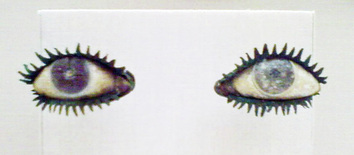
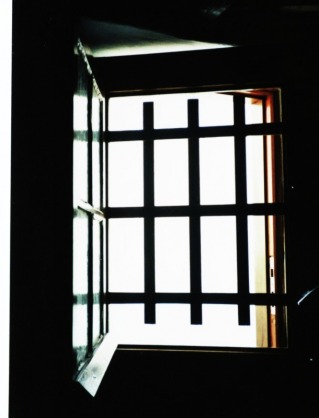
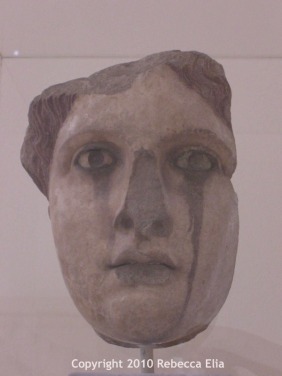
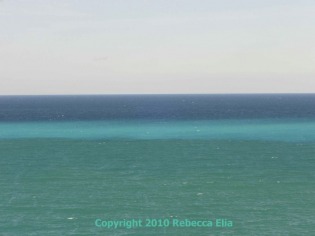
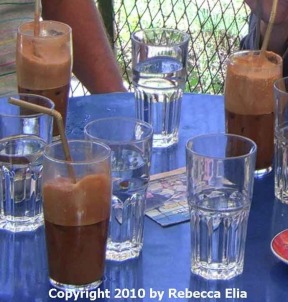


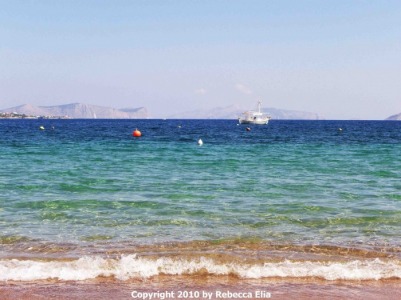

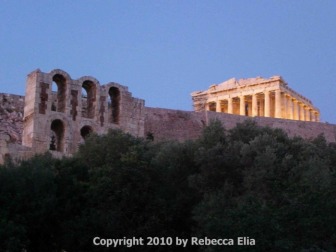
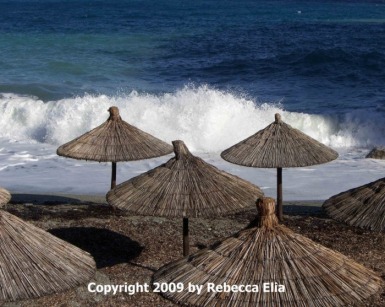
 RSS Feed
RSS Feed

